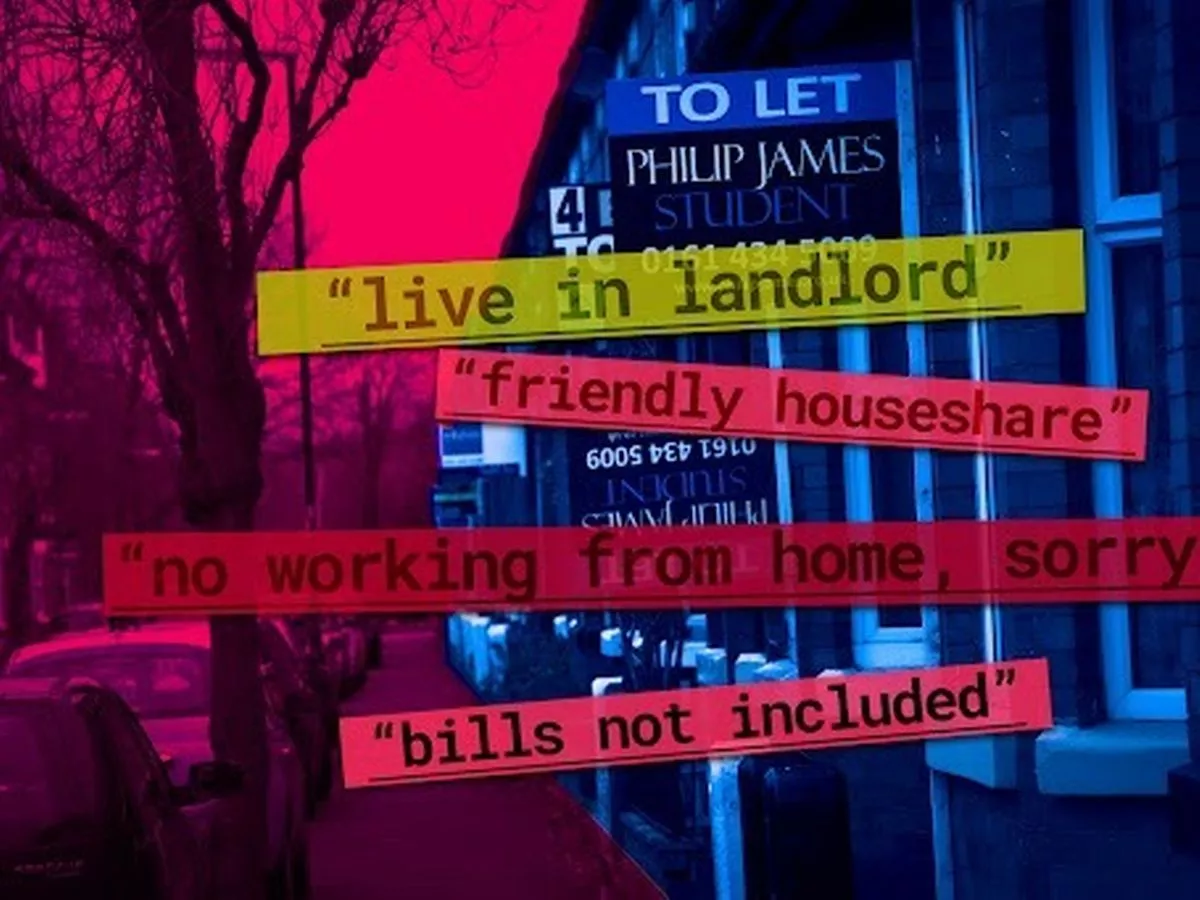Copyright manchestereveningnews

Thunderous footsteps overhead stomping you awake. The hiss of the shower turning on just as you were about to have a quick splash before work. You get back that evening, starving and exhausted - and someone’s in the kitchen with the ingredients for an apparent ten course meal laid out across the counters like a feast for Henry VIII. Even worse - they have their friends round. But don’t worry - there’s just enough room to fit your food on your shelf in the fridge. You might get a chance to cook by the time they clear out of there. At 9pm. You can hear every word of your housemate’s conversation with their boyfriend through the plywood 'walls' of the house, which your landlord - who lives abroad, naturally - deemed suitable for three grown adults to cohabitate in. Your other housemate is the type to make loud, lengthy phone calls to their family back home. Every evening. You finally eat, clear up, and lie in a tepid bath, scrolling on your phone, every word of the Peep Show episode your other housemate is watching ringing clearly through the wall. Day done, you finally collapse into bed in your shoebox room – only to be woken at 3am by the creaking step of someone getting back from a night out. “D’you think you could let me know next time you’ll be out that late?” you ask. Blank stare back like you’re speaking a different language. That might sound like the day from hell - and while I never had a day quite that bad – all were hallmarks and regular fixtures of my life in a house-share. Some people have great experiences in shares. I’m happy for them. I certainly hoped I could be among the lucky few. As I scrolled the blue and white desert of Spare Room, visions of my imaginary flatmates and I all tucked up on the sofa bonding over Molly Mae: Behind It All or cackling over glasses of wine on a Friday night danced across my mind like beautiful phantoms. For me, sadly, it never came true. It’s a truism, almost too obvious to be worth stating, that we all want to lead our lives in the manner we see fit. We want to get up when we want; eat, wash, socialise when we like; and it's annoying when other people get in the way of that. Living with anyone, those inconveniences are part of the deal. But if you know them well, the dynamic is obvious: you might annoy each other, but you also know there is love deep down, and if all else fails, you have the fact of your relationship - we’re family/friends/partners! - to appeal to. With strangers, there is no such understanding. You have no relationship. When you appeal to their sense of common humanity - please could you not do this thing that bothers me - they look at you like you have two heads. You are sharing a wall with people who don’t care if you live or die. The cold remove with which housemates can treat each other also creates a strange sense of alienation. Your conversations have all the cosiness of two work colleagues who just met - and yet your toothbrushes are side by side, shoes on top of each others' in the cupboard. You quickly learn how horribly easy it is to feel alone even in a house full of people. While endless column inches have been devoted to the extortionate costs of renting and mortgages, I believe not enough attention has been paid to the experience of living cheek by jowl with total strangers. I couldn’t find an exact estimate for quite how many adults are living in a house share across the country, but it must be in the hundreds of thousands - if not millions. And it will be especially true in Manchester, where developers and marketing executives are falling over themselves to tell us how ‘buzzy’ a new area is, young professionals are moving here in droves, and average private rents are well on their way to £1,500. I’m not saying house shares are a new phenomenon. Nor am I saying my generation invented them. But the formerly established pattern of aspiration - leave school or university, scrape by in your 20s, settle down to a career and get on the property ladder by 30 - doesn’t seem to exist anymore. Hamstrung by eye-watering rents, unable to find a friend to shack up with, and unwilling to live with family, it’s something many of us are forced into. What impact is this going to have, long term? Is it any wonder the birth rate is falling, as it has, to an all-time low in 2025? And is it any surprise that gen Z are having less sex? We are all terrified we’re going to be overheard. Would you be able to relax and ‘get in the mood’ with the sound of your housemate making a smoothie reverberating up through the floor? And what will the psychological effects be? The number of young people not in work, education or training is about to pass one million. I can’t say I blame them. How hard would you want to work, knowing that this would likely be your future? It's the every-day, micro stresses that wear you down. Bowls in the sink; slamming doors at night; the machine full of soaked washing when you're down to your last sock. Little things individually, but adding up to the persistent, gradual erosion of your peace of mind. It's something Alfie Matischok knows all too well. The 21-year-old has just graduated from a university course in nursing in Manchester - but lived with non-students throughout his course. "I did 13-hour placements, which were hard work," he told me. "My housemates' uni life was more about partying. They'd be knocking and banging on my door at 4am after nights out, and I had to be up at 6." Alfie's second year house, with five other students in Fallowfield, was less than ideal. "I would meal prep food to take to my placement and the next day it would be gone. They had house parties blasting music on a massive speaker and there were arguments about the heating. "I don't mind having it on in October, but by April, it was getting a bit ridiculous. I turned it off one morning and came back to a big argument. At the end of the year, they left loads of mess that I had to clean up or I'd lose my deposit." It had a major impact on him. "I hated my second year because of my living situation and I couldn't see a way out of it. "There's that pressure in first year to pick who you are living with by November. It was so soon and I felt a bit tied to people I barely knew. "But I thought, if I got another house, it could be even worse. It was a real burden." There was a silver lining to the situation though, which came in the form of a new housemate arriving from overseas. "They told me they were gay but that they were in the closet back home," he said. "Being gay myself, I tried to encourage them and we went out to the Gay Village together. "Over time they became more comfortable with it. It will stay with me forever that I made a difference to someone's life. We're still in touch now, but we never would have met otherwise." Of course, haphazard living arrangements are something of an expectation at university. Olivia, 28, started out in halls when she began student life in 2015 - and is now on her ninth house-share. "W hen it goes well, it can be a great experience and one that’s really fulfilling," she said. "I think everyone should do it if they have the chance. It is character building. "But when it goes wrong, it can be a nightmare and it’s frustrating because there’s no escape. It feels like you have no other choice at this age." After leaving halls, she lived in a couple of 'really dodgy' HMOs. " I viewed the room before signing and was bowled over by cheap rent - it never occurred to me to ask about the other people living there. "The contract was a Word document and I’m pretty sure when I got my deposit back he paid it all in cash. "I soon discovered I was living somewhere where nobody talks to each other and people live in their rooms like ships passing in the night. "I wish it was obligatory to share some basic information about yourself in HMOs - name, age, job, phone number. It can be really unnerving sleeping in the same building as people you know nothing about, and essentially sharing bathrooms and kitchens with strangers. "I don't think that was safe. It’s a gamble every time - you do not know what someone will be like to live with until it is too late." Now, she lives with people she would describe as friends. "We have our routines but we might watch a film together. I think the best dynamics are where you do things together but you are still independent," she said. "But it can be emotionally draining never having the communal space fully to yourself. After a long day at work I might want to chill out on the sofa - but my flatmate might already be there. It's that lack of control. "That’s fine when you are a student, you’re more fluid. But as you get older, and start a professional job, that stress starts to eat away at you." A friend of mine in his 20s now lives with his partner, having done his time in house shares. After graduating, he moved in with 'a friend of sorts' who offered him a room in their house. "I felt safe in knowing enough about her that we had shared interests and would likely get along," he said. "But until you really spend time in close quarters with someone, you never really know what the experience will be." The cracks 'soon be gan to show', with his flatmate becoming increasingly volatile. They were dealing with personal issues which, prior to moving in, he knew nothing about. "Room share websites, although helpful and needed in the housing climate, rarely vet people," he reflects now. "You know very little about them until you are sharing mugs and fighting over the remote controls, or who gets free reign of the shared areas. "There is always a risk involved. You are at your most vulnerable in a space with people who could really be anyone and it's too late by the time the contracts are signed and the removal men have driven away." One person I spoke to had nice things to say about house shares. Bethany Lee, 29, liked her housemates so much she ended up founding a business with them. "I bought a house with my ex just before Covid hit, but then we split up," she told me. "I had the house on my own and I had that moment of clarity of, what am I doing? I have these empty rooms and I need new people in my life." Bethany listed the rooms on SpareRoom and has, ever since, had a total of seven women living with her. "It turned into some incredibly supportive, enriching relationships," she said. "They're now some of my closest friends, and I ended up setting up Third Place with two of them." Third Place is a company hosting in-person, ticketed events for women in Manchester, which regularly sell out. They do everything from rock climbing, ornament making, pilates, yoga and parties - with the simple aim of meeting up, making friends and finding a community. "I know I was incredibly lucky to find the friends I did," Bethany said. "I thought, wouldn't it be great if I could share this feeling with others? "The worst thing is feeling lonely, but when you're out of education, how are you supposed to make friends? I don't want anyone to feel as isolated and alone as I did. "It's mad thinking that the women I run it with now were once just profiles on Spare Room. You'd never think then that it would turn into a whole community."



